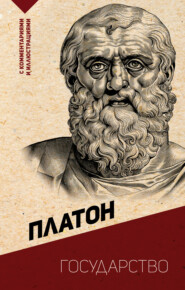По всем вопросам обращайтесь на: info@litportal.ru
(©) 2003-2025.
✖
The Republic
Настройки чтения
Размер шрифта
Высота строк
Поля
Of the many excellences which I perceive in the order of our State, there is none which upon reflection pleases me better than the rule about poetry.
To what do you refer?
To the rejection of imitative poetry, which certainly ought not to be received; as I see far more clearly now that the parts of the soul have been distinguished.
What do you mean?
Speaking in confidence, for I should not like to have my words repeated to the tragedians and the rest of the imitative tribe – but I do not mind saying to you, that all poetical imitations are ruinous to the understanding of the hearers, and that the knowledge of their true nature is the only antidote to them.
Explain the purport of your remark.
Well, I will tell you, although I have always from my earliest youth had an awe and love of Homer, which even now makes the words falter on my lips, for he is the great captain and teacher of the whole of that charming tragic company; but a man is not to be reverenced more than the truth, and therefore I will speak out.
Very good, he said.
Listen to me then, or rather, answer me.
Put your question.
Can you tell me what imitation is? for I really do not know.
A likely thing, then, that I should know.
Why not? for the duller eye may often see a thing sooner than the keener.
Very true, he said; but in your presence, even if I had any faint notion, I could not muster courage to utter it. Will you enquire yourself?
Well then, shall we begin the enquiry in our usual manner: Whenever a number of individuals have a common name, we assume them to have also a corresponding idea or form: – do you understand me?
I do.
Let us take any common instance; there are beds and tables in the world – plenty of them, are there not?
Yes.
But there are only two ideas or forms of them – one the idea of a bed, the other of a table.
True.
And the maker of either of them makes a bed or he makes a table for our use, in accordance with the idea – that is our way of speaking in this and similar instances – but no artificer makes the ideas themselves: how could he?
Impossible.
And there is another artist, – I should like to know what you would say of him.
Who is he?
One who is the maker of all the works of all other workmen.
What an extraordinary man!
Wait a little, and there will be more reason for your saying so. For this is he who is able to make not only vessels of every kind, but plants and animals, himself and all other things – the earth and heaven, and the things which are in heaven or under the earth; he makes the gods also.
He must be a wizard and no mistake.
Oh! you are incredulous, are you? Do you mean that there is no such maker or creator, or that in one sense there might be a maker of all these things but in another not? Do you see that there is a way in which you could make them all yourself?
What way?
An easy way enough; or rather, there are many ways in which the feat might be quickly and easily accomplished, none quicker than that of turning a mirror round and round – you would soon enough make the sun and the heavens, and the earth and yourself, and other animals and plants, and all the other things of which we were just now speaking, in the mirror.
Yes, he said; but they would be appearances only.
Very good, I said, you are coming to the point now. And the painter too is, as I conceive, just such another – a creator of appearances, is he not?
Of course.
But then I suppose you will say that what he creates is untrue. And yet there is a sense in which the painter also creates a bed?
Yes, he said, but not a real bed.
And what of the maker of the bed? were you not saying that he too makes, not the idea which, according to our view, is the essence of the bed, but only a particular bed?
Yes, I did.
Then if he does not make that which exists he cannot make true existence, but only some semblance of existence; and if any one were to say that the work of the maker of the bed, or of any other workman, has real existence, he could hardly be supposed to be speaking the truth.
At any rate, he replied, philosophers would say that he was not speaking the truth.
No wonder, then, that his work too is an indistinct expression of truth.
No wonder.
Suppose now that by the light of the examples just offered we enquire who this imitator is?
If you please.
Well then, here are three beds: one existing in nature, which is made by God, as I think that we may say – for no one else can be the maker?
No.
There is another which is the work of the carpenter?
Yes.
And the work of the painter is a third?
Yes.

















